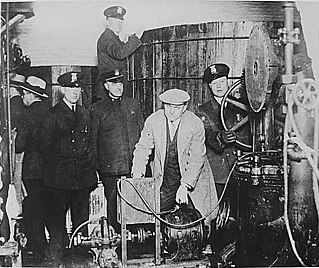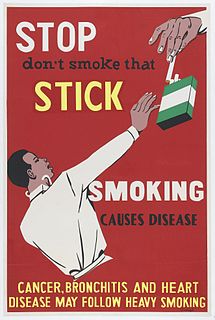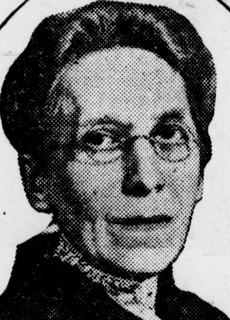Related Research Articles

Prohibition is the act or practice of forbidding something by law; more particularly the term refers to the banning of the manufacture, storage, transportation, sale, possession, and consumption of alcoholic beverages. The word is also used to refer to a period of time during which such bans are enforced.

The Eighteenth Amendment of the United States Constitution established the prohibition of alcohol in the United States. The amendment was proposed by Congress on December 18, 1917, and was ratified by the requisite number of states on January 16, 1919. The Eighteenth Amendment was repealed by the Twenty-first Amendment on December 5, 1933.

Tobacco smoking is the practice of burning tobacco and ingesting the smoke that is produced. The smoke may be inhaled, as is done with cigarettes, or simply released from the mouth, as is generally done with pipes and cigars. The practice is believed to have begun as early as 5000–3000 BC in Mesoamerica and South America. Tobacco was introduced to Eurasia in the late 17th century by European colonists, where it followed common trade routes. The practice encountered criticism from its first import into the Western world onwards but embedded itself in certain strata of a number of societies before becoming widespread upon the introduction of automated cigarette-rolling apparatus.

Smoking bans, or smoke-free laws, are public policies, including criminal laws and occupational safety and health regulations, that prohibit tobacco smoking in certain areas, usually in enclosed workplaces and other public spaces. Such policies are usually enacted to protect people from the negative health effects of passive smoking or second-hand smoke (SHS) exposure.
Action on Smoking and Health (ASH) is the name of a number of autonomous pressure groups (charities) that seek to publicize the risks associated with tobacco smoking and campaign for greater restrictions on cigarette and tobacco sales.

Prohibition in Canada was a ban on alcoholic beverages that arose in various stages, from local municipal bans in the late 19th century, to provincial bans in the early 20th century, and national prohibition from 1918 to 1920. The relatively large and powerful beer and alcohol manufacturing sector, and the huge working class that purchased their products, failed to convince any of the governments to reverse their stance on prohibition. Most provinces repealed their bans in the 1920s, though alcohol was illegal in Prince Edward Island from 1901 to 1948. By comparison, Ontario's temperance act was in effect from 1916 to 1927.

In the early 20th century, German researchers made advances in linking smoking to health harms, which strengthened the anti-tobacco movement in the Weimar Republic and led to a state-supported anti-smoking campaign. Early anti-tobacco movements grew in many nations from the middle of the 19th century. The 1933–1945 anti-tobacco campaigns in Nazi Germany have been widely publicized, although stronger laws than those passed in Germany were passed in some American states, the UK, and elsewhere between 1890 and 1930. After 1941, anti-tobacco campaigns were restricted by the Nazi government.

Tobacco politics refers to the politics surrounding the use and distribution of tobacco.

Tobacco control is a field of international public health science, policy and practice dedicated to addressing tobacco use and thereby reducing the morbidity and mortality it causes. Since most cigarettes and cigars and hookahs contain/use tobacco tobacco control also impacts these. E-cigarettes do not contain tobacco itself, but (often) do contain nicotine. Tobacco control is a priority area for the World Health Organization (WHO), through the Framework Convention on Tobacco Control. References to a tobacco control movement may have either positive or negative connotations.

Prohibition in the United States was a nationwide constitutional ban on the production, importation, transportation, and sale of alcoholic beverages from 1920 to 1933.
Smoking in China is prevalent, as the People's Republic of China is the world's largest consumer and producer of tobacco: there are 350 million Chinese smokers, and China produces 42% of the world's cigarettes. The China National Tobacco Corporation is by sales the largest single manufacturer of tobacco products in the world and boasts a monopoly in Mainland China generating between 7 and 10% of government revenue. Within the Chinese guanxi system, tobacco is still a ubiquitous gift acceptable on any occasion, particularly outside urban areas. Tobacco control legislation does exist, but public enforcement is rare to non-existent outside the most highly internationalized cities, such as Shanghai and Beijing. Outside the mainland however, enforcement is strong in the Hong Kong special administrative region. Furthermore, outside the largest cities in China, smoking is considered socially acceptable anywhere at any time, even if it is technically illegal.

On most public transport systems, there are at least some activities passengers are prohibited to engage in. Activities like these, which can be restricted in vehicles, stations, and other property of the agency, are prohibited for a variety of reasons. These include keeping other passengers safe and comfortable, protecting the operator, or protecting the vehicles and stations.

Smoking in Nigeria is prohibited in public places and is punishable by a fine of not less than N200 and not exceeding N1000 or to imprisonment to a term of not less than one month and not exceeding two years or to both a fine and imprisonment.
Smoking in Ireland is banned fully in the general workplace, enclosed public places, restaurants, bars, education facilities, healthcare facilities and public transport. However, it is permitted in designated hotel rooms and there is no ban in residential care, prisons and in outdoor areas. Public opinion is in favour of the bans on smoking imposed in Ireland.

Plain tobacco packaging, also known as generic, neutral, standardised or homogeneous packaging, is packaging of tobacco products, typically cigarettes, without any branding, including only the brand name in a mandated size, font and place on the pack, in addition to the health warnings and any other legally mandated information such as toxic constituents and tax-paid stamps. The appearance of all tobacco packs is standardised, including the colour of the pack.

Lucy Page Gaston was an anti-tobacco activist of the late 19th and early 20th century. She was the founder of the Anti-Cigarette League of America, which had as its goal the abolition of cigarettes.
Smoking in India has been known since at least 2000 BC when cannabis was smoked and is first mentioned in the Atharvaveda. Fumigation (dhupa) and fire offerings (homa) are prescribed in the Ayurveda for medical purposes and have been practiced for at least 3,000 years while smoking, dhumrapana (धूम्रपान), has been practiced for at least 2,000 years. Tobacco was introduced to India in the 17th century. It later merged with existing practices of smoking.
Regulation of electronic cigarettes varies across countries and states, ranging from no regulation to banning them entirely. For instance, e-cigarettes were illegal in Japan, which forced the market to use heat-not-burn tobacco products for cigarette alternatives. Others have introduced strict restrictions and some have licensed devices as medicines such as in the UK. However, as of February 2018, there is no e-cigarette device that has been given a medical license that is commercially sold or available by prescription in the UK. As of 2015, around two thirds of major nations have regulated e-cigarettes in some way. Because of the potential relationship with tobacco laws and medical drug policies, e-cigarette legislation is being debated in many countries. The companies that make e-cigarettes have been pushing for laws that support their interests. In 2016 the US Department of Transportation banned the use of e-cigarettes on commercial flights. This regulation applies to all flights to and from the US. In 2018, the Royal College of Physicians asked that a balance is found in regulations over e-cigarettes that ensure product safety while encouraging smokers to use them instead of tobacco, as well as keep an eye on any effects contrary to the control agencies for tobacco. A recent study shows electronic device company "JUUL" contains carcinogens and other harmful ingredients inside their e-juice cartridges.

As nicotine is highly addictive, marketing nicotine-containing products is regulated in most jurisdictions. Regulations include bans and regulation of certain types of advertising, and requirements for counter-advertising of facts generally not included in ads. Regulation is circumvented using less-regulated media, such as Facebook, less-regulated nicotine delivery products, such as e-cigarettes, and less-regulated ad types, such as industry ads which claim to discourage nicotine addiction but seem, according to independent studies, to promote teen nicotine use.
References
- ↑ Cassandra Tate (1999). Cigarette Wars: The Triumph of the 'Little White Slaver. Oxford University Press.
- ↑ Southall, Sophia J. (1918). "Shall We Smoke?". The American Journal of Nursing. 18 (6): 459–460. JSTOR 3406369.
- ↑ Alston, Lee; Dupré, Ruth; Nonnenmacher, Tomas (2002). "Social reformer and regulation: The prohibition of cigarettes in the United States and Canada" (PDF). Explorations in Economic History. 39 (4): 425–445. doi:10.1016/S0014-4983(02)00005-0. Archived from the original (PDF) on August 12, 2017. Retrieved September 4, 2017.
- ↑ Richards, Jeremy (August 1, 2008). "History Shows Smoking Bans Likely to Be Repealed". The Heartland Institute. Retrieved April 29, 2010.